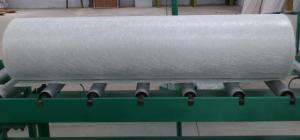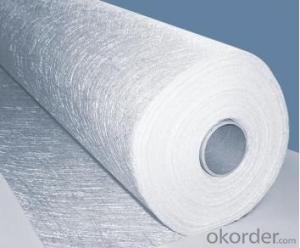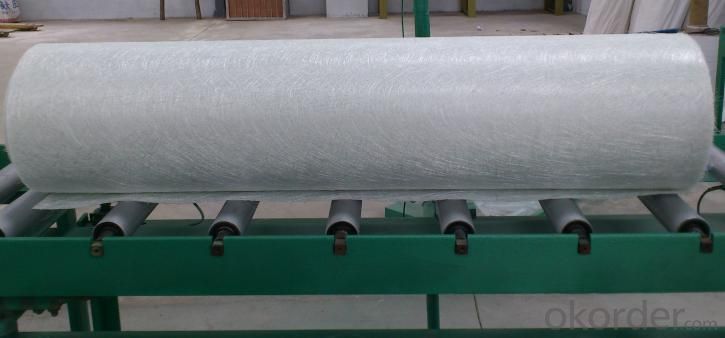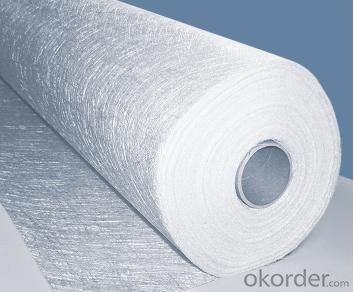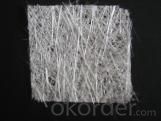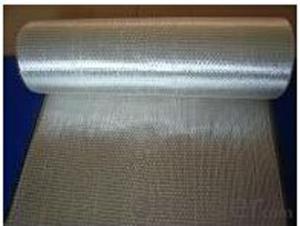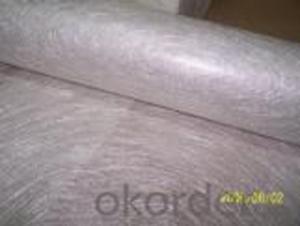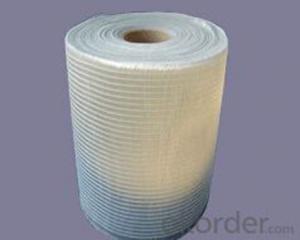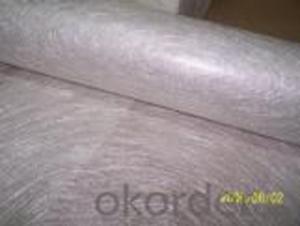Fiberglass Mat Tissue - C-Glass Stitch Chopped Strand Mat 450gsm, 50-2400mm
- Loading Port:
- Shanghai
- Payment Terms:
- TT or LC
- Min Order Qty:
- 2000 m²
- Supply Capability:
- 1000MT/Month m²/month
OKorder Service Pledge
OKorder Financial Service
You Might Also Like
Process
Fiberglass stitch chopped strand mat is the mat made of fiberglass roving which is at first be cut into certain length and evenly unfolded in all directions and then stitched with polyester yarn.
Properties
• Fiberglass no certain direction, good homogeneity.
• No powder or emulsion; sink quickly and easy to operate
• High tensile strength, easy to operate
• Good impact strength of finished products
Applications
Mainly be used as reinforced materials in the composite material industry.
• Matrix: unsaturated polyester resin, vinyl ester resin, epoxy resin and phenolic resin etc.
• Craft: winding, pultrusion, RTM, molded, hand lay up, etc.
• Ultimate products: Liner layer of tube, pultruded profiles, FRP body of boat, insulation board
IMAGES:
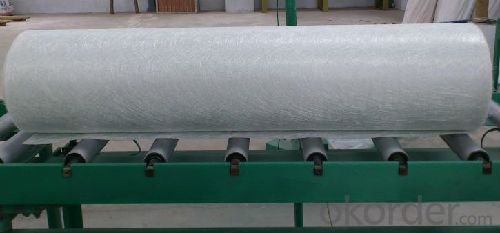
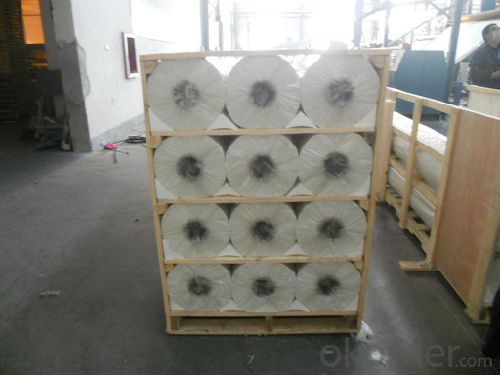
Specifications
Fibre type | Areal weight | Width | |
(g/㎡) | (mm) | ||
EMK 300 | E-Glass | 300 | 50-2400 |
EMK380 | E-Glass | 380 | 50-2400 |
EMK450 | E-Glass | 450 | 50-2400 |
CMK 300 | C-Glass | 300 | 50-2400 |
CMK380 | C-Glass | 380 | 50-2400 |
CMK450 | C-Glass | 450 | 50-2400 |
Packaging: Wrapped in PVC and placed within a cardboard carton. | |||
FAQ:
1. Why Choose us?
CNBM is a stated own company, provide the guarantee for the best quality, best service and safety business.
2. How will we guarantee the quality?
a, ISO 9001-2008 quality control system;
b, Strict and regular quality control in production;
c, Inspeciation when loading into container before shippment;
d, Sample stock for one year for quality tracing and record.
3. What is your MOQ?
Our MOQ is one pallet.
4. Can you provide sample?
Yes, samples are in stock. we can offer free sample for you.
5. Payment terms?
We can accept L/C, T/T etc.
6. Do you offer OEM service?
Yes, we can print customers’ logo on the packaging;
And the size and specification can be produced and design according to your demand.
7. What is the Production Lead Time?
1 *40HQ each day.
- Q: Can fiberglass mat tissue be used for flooring insulation?
- Typically, fiberglass mat tissue is not employed for flooring insulation. It is a lightweight substance frequently utilized in the construction sector to reinforce plaster and concrete, and as insulation in walls and ceilings. However, for flooring insulation purposes, other materials like foam boards or batt insulation are generally favored. These materials offer superior thermal and sound insulation features that are specifically tailored for flooring applications. Moreover, they are simpler to install and better equipped to endure the pressures and demands of foot traffic on the flooring.
- Q: What are the main applications of fiberglass mat tissue?
- Fiberglass mat tissue, an adaptable material, finds diverse applications in industries like construction, automotive, aerospace, and marine. Key uses of this material comprise: 1. Construction: Fiberglass mat tissue commonly reinforces and strengthens building materials in the construction industry, including roofing shingles, wallboards, and cementitious products. It enhances tensile strength and durability, rendering the structures more resistant to cracks, water damage, and weathering. 2. Automotive: The manufacturing of automotive parts, such as dashboards, door panels, and trunk liners, heavily relies on fiberglass mat tissue. It imparts structural integrity, sound insulation, and heat resistance, contributing to safer and more comfortable vehicles. 3. Aerospace: Lightweight composite materials used in aircraft structures benefit from the inclusion of fiberglass mat tissue. This material aids in reducing overall weight, improving fuel efficiency, and enhancing performance. 4. Marine: Fiberglass mat tissue plays a significant role in boat and shipbuilding. It provides strength, stiffness, and resistance to water and corrosion in the construction of hulls, decks, and other components. Its lightweight, durability, and low maintenance requirements make it preferable to traditional materials like wood. 5. Electrical and Electronics: Fiberglass mat tissue serves electrical insulation purposes, such as transformer boards, electrical cabinets, and switchgear. Its excellent dielectric properties, heat resistance, and mechanical strength ensure the safety and reliability of electrical equipment. 6. Filtration: Various filtration applications, such as air filters, water filters, and oil filters, employ fiberglass mat tissue. It acts as a filtration medium, capturing and eliminating impurities, dust, and particles from air, water, or oil, thereby enhancing the quality and purity of filtered substances. In summary, fiberglass mat tissue finds extensive use across industries due to its strength, durability, lightweight nature, and resistance to environmental factors. Its versatility enables it to be an indispensable component in diverse applications, contributing to the development of safer, sturdier, and more efficient products.
- Q: Is fiberglass mat tissue suitable for electrical insulation applications?
- Yes, fiberglass mat tissue is suitable for electrical insulation applications. It possesses excellent dielectric properties, high tensile strength, and thermal resistance, making it an ideal material for insulating electrical components and preventing electrical current leakage.
- Q: Does fiberglass mat tissue provide any UV resistance?
- Yes, fiberglass mat tissue does provide some level of UV resistance. The resin used to bind the fibers in the fiberglass mat tissue helps protect it from the harmful effects of UV radiation. However, prolonged exposure to sunlight can still cause some degradation over time, so additional UV protection measures may be necessary for long-term durability.
- Q: Can fiberglass mat tissue be used for insulation in commercial buildings?
- Yes, fiberglass mat tissue can be used for insulation in commercial buildings. It is a common and effective insulation material that provides thermal insulation, soundproofing, and fire resistance properties. It is often used in commercial buildings to improve energy efficiency and create a comfortable indoor environment.
- Q: Is fiberglass mat tissue suitable for insulation in laboratories?
- Insulation in laboratories can be effectively achieved using fiberglass mat tissue. This material is widely used for thermal insulation due to its exceptional thermal properties. With its high resistance to heat transfer, fiberglass mat tissue serves as an efficient insulator, maintaining stable temperatures within laboratory spaces. Moreover, fiberglass mat tissue offers resistance against moisture, chemicals, and fire, all of which are critical factors in laboratory settings. It can withstand exposure to harsh chemicals without degrading or losing its insulating properties over time. Therefore, it is an ideal choice for insulation in laboratories where various chemicals and substances are handled. In addition, the installation of fiberglass mat tissue is hassle-free and can be tailored to meet specific insulation requirements. It can be easily applied to walls, ceilings, and pipes, creating a barrier that prevents the transfer of heat and ensuring a controlled environment within the laboratory. In summary, fiberglass mat tissue is a suitable option for laboratory insulation due to its thermal resistance, chemical resistance, fire resistance, and ease of installation. It aids in maintaining stable temperatures, safeguards against chemical exposure, and ensures safety in laboratory environments.
- Q: Is fiberglass mat tissue suitable for insulation in residential buildings?
- Yes, fiberglass mat tissue is suitable for insulation in residential buildings. It is a widely used and effective insulation material that offers excellent thermal performance, soundproofing capabilities, and fire resistance. Additionally, it is easy to install, durable, and does not degrade over time.
- Q: What is the expected lifespan of fiberglass mat tissue in cleanroom applications?
- Several factors can influence the expected lifespan of fiberglass mat tissue in cleanroom applications. The durability and long-lasting properties of fiberglass mat tissue are well-known in cleanrooms. However, variables such as contamination level, cleaning procedures, maintenance practices, and overall cleanroom conditions can impact its lifespan. By providing proper care and regular maintenance, fiberglass mat tissue can typically endure for several years in cleanroom applications. Extending its lifespan can be achieved through frequent cleaning and replacing any damaged or contaminated sections. Following the manufacturer's guidelines and recommendations for cleaning and maintenance is crucial to ensure optimal performance and longevity. Furthermore, the expected lifespan of fiberglass mat tissue can also be influenced by its quality and grade. Higher-quality materials exhibit greater resilience and can withstand environmental stressors better than lower-grade options. Therefore, investing in high-quality fiberglass mat tissue can contribute to a longer lifespan in cleanroom applications. To summarize, there is no definitive answer regarding the exact expected lifespan of fiberglass mat tissue in cleanroom applications. However, regular maintenance, proper care, and the use of high-quality materials can significantly increase its longevity.
- Q: Can fiberglass mat tissue be used for making lightweight furniture?
- Fiberglass mat tissue has the capability to create lightweight furniture. This material is composed of glass fibers bonded with resin, resulting in a thin and light substance. Its exceptional strength-to-weight ratio has made it widely used in different industries such as automotive, aerospace, and construction. In furniture production, fiberglass mat tissue can be layered and shaped into various forms, providing both structural support and rigidity while keeping the weight of the furniture low. This makes it an excellent choice for crafting lightweight furniture pieces that are easy to move and transport. Furthermore, fiberglass mat tissue exhibits impressive durability and resistance to moisture, chemicals, and heat, making it suitable for indoor and outdoor furniture applications. Its versatility empowers furniture designers and manufacturers to create innovative and distinctive designs while maintaining the desired lightweight characteristics. However, it is crucial to consider that the quality and performance of the final product also rely on the overall design, construction, and other materials used in conjunction with fiberglass mat tissue. To ensure the furniture's longevity, stability, and safety, proper engineering and manufacturing techniques should be applied.
- Q: Is fiberglass mat tissue suitable for automotive applications?
- Fiberglass mat tissue is indeed suitable for automotive applications. This versatile material offers numerous benefits when utilized in the automotive industry. It boasts excellent strength and durability, crucial qualities for automotive parts that must endure harsh conditions and heavy use. Moreover, fiberglass mat tissue possesses commendable thermal and electrical insulation properties, making it ideal for applications that require resistance to temperature and electrical currents. Furthermore, the lightweight nature of fiberglass mat tissue can contribute to enhanced fuel efficiency and overall vehicle performance. It is also highly malleable, enabling manufacturers to craft intricate automotive parts with precision. Additionally, this material resists corrosion, chemicals, and UV radiation, ensuring that automotive components remain reliable and long-lasting. In summary, the exceptional qualities of fiberglass mat tissue make it an optimal choice for various automotive applications, such as body panels, interior components, structural reinforcements, and sound insulation. Its strength, durability, insulation properties, lightweight nature, and resistance to corrosion and chemicals make it a dependable and cost-effective material for the automotive industry.
Send your message to us
Fiberglass Mat Tissue - C-Glass Stitch Chopped Strand Mat 450gsm, 50-2400mm
- Loading Port:
- Shanghai
- Payment Terms:
- TT or LC
- Min Order Qty:
- 2000 m²
- Supply Capability:
- 1000MT/Month m²/month
OKorder Service Pledge
OKorder Financial Service
Similar products
Hot products
Hot Searches
Related keywords
